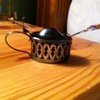Posted 12 years ago
 Stillwater
Stillwater
(217 items)
Got this today, its 14k rose gold, very heavy, weighs 25.1 grams. It so large that it looks fake I guess, it was only a dollar.
I know there is an immense amount of symbolism in these Masonic fraternities, I was wondering if anyone knew what the calla lily on the back symbolized, and URHP? The inscriptions on the sides are done in a late 19th - early 20th century style, but I'm not sure if its that old or not.
Its got $784 in gold, I don't think anyone would pay much more than that for it, so I'll probably just keep it.
Does anyone know anything about it?

























You did do well there, Stillwater! I think it's a great piece.
Thanks Kevin! These Masonic things can be real sleepers, I've found a lot of very large medallions and badges like this from the Shriners, Elks, and Masons, they can be really heavy and a lot of them are unmarked! Those are something you should keep an eye out for when you're out hunting, it can really pay off. I have no idea why they're not marked, but a lot of them are solid 14k gold.
You don't seem to be into jewelry though I guess, you don't post much of it here. Do you ever rummage through the jewelry piles at flea markets and estate sales looking for gold or silver?
Thanks Phil, I bet you'r right on, it sure looks like its from the 1930's. Are you in the BPOE?
Calla lily symbolism: purity, devotion, beauty, love; weddings, funerals, rebirth.
But on the edge is some information:
Can I read M.D. Ullman? Peoria, Ill.
K.P. Calanthe No 47.
This refers to the Knights of Pythias.
"Calanthe Lodge, No. 47, was organized March 24, 1874, by Grand Chancellor H. W. Rice, of Chicago, assisted by P. C, M. C. Wilkie, of Aurora, and P. Cs., Wm. L. Campbell, C. C. Weidrich and Seely, of Princeton. There were fourteen charter members...."
The Knights of Pythias was founded in 1864 in Washington, D.C., as a secret society for government clerks, but admission and goals have both broadened since. The order now functions as a fraternal organization with service aspects, in the United States and Canada. It publishes the Pythian International quarterly. There were 80,000 members in 1994.
http://www.stichtingargus.nl/vrijmetselarij/pythias_en.html
The Ullmans had a history of involvement with the Lodge. David, Henry and Aaron were members of the Progress Lodge, No. 113 that had regular meetings at 216 and 218 Main Street, Peoria a couple of blocks away from the Illinois River on first and third Sundays of each month.
http://www.ebooksread.com/authors-eng/chicago-johnson--co/the-history-of-peoria-county-illinois-containing-a-history-of-the-northwest--h-nho/page-86-the-history-of-peoria-county-illinois-containing-a-history-of-the-northwest--h-nho.shtml
This is an interesting read too on the Knights of Pythias:
http://books.google.com.au/books?id=_ncZNBsnqsEC&pg=PA45&lpg=PA45&dq=Knights+of+Pythias+peoria&source=bl&ots=WkR0THOVTu&sig=vAEuyT3vhBlyd5BWS3A86q8Hh9Y&hl=en&sa=X&ei=_RHmUNrpOcX4mAXlhoBY&ved=0CDAQ6AEwAA#v=onepage&q=Knights%20of%20Pythias%20peoria&f=false
The Knights of Pythias had a rank of UR.
http://en.wikipedia.org/wiki/Knights_of_Pythias
"Early in the group's history, some Pythians formed the Uniformed Rank, which adopted military terminology for its organization. Swords owned by a member of the Uniformed Rank might be inscribed with the acronym, "UR," a dove, or a lily. (The Uniformed Rank was banned in the organization in the 1950s.)"
I'm still working on the HP part!
This one really is a sleeper.
If you search on ebay you'll see some pressed metal calla lily buttons.
This however is in another league completely!
Just had a thought: Is it HP or KP?
Uniformed Rank Knights of Pythias?
Or is that taking the easy way out?
It seems they are referred to as "Pythian Jewels".
"The Uniformed Rank (UR) came into being in 1878. A great many Pythians were Civil War Veterans and some lodges formed their own military drill teams. This would in time evolve into the Uniformed Ranks, not just for the Pythians but for quite a number of other fraternal orders as well. The Pythian UR was sometimes known as the Army of the Lily.
In many ways, the UR was simply a logical outgrowth of the K of P. The order, having been founded in the midst of the Civil War and by men working for the government--and effectively enlistees--had always had a military flavor to it. Its ranks of Page, Esquire, and Knight emulated those of Medieval knighthood. The UR was seen as sort of an unofficial reserve force, maintaining a military readiness should the Nation need them--its Manual of Drill was that of the US Army. In reality, the UR was more of a fancy drill team suitable for parades and other official functions. As Civil War veterans died off in the early 1900’s, the UR went into decline and was effectively defunct around the time of World War Two. Major General James Carnahan’s hope for an everlasting UR was not to be and it had entirely ceased to exist by the 1950’s."
http://www.phoenixmasonry.org/masonicmuseum/fraternalism/knights_of_pythias.htm
"At the turn of the Twentieth Century, It was in to be a Pythian"
They have a website and might be able to help you:
http://www.pythias.org
"“FCB” stands for FRIENDSHIP, CHARITY, and BENEVOLENCE- the three cardinal principles of the Order to which we adhere very strongly, even today. You will see it wherever Pythianism is mentioned
On some swords. the letters “U R” (not V R) stand for Uniformed Rank. Just after the fraternity was founded, a very elite group of Pythians fashioned themselves into a militaristic type of organization. They had their own military uniforms, they referred to their lodges as military units, they called themselves by military titles, they went to “encampments” instead of conventions, and they even had their own set of rules and regulations. They excelled in marching and in drills, but the group became very disruptive to the Order and the last unit was finally disbanded in the 1950’s. The Uniformed Rank used the Lily as its official flora but the Knights use the sprig of myrtle, which signifies love and victory. It is placed on the casket of a brother to show that he was loved by his fellow Pythians. The Knights picture a falcon which signifies vigilance, whereas the U R used the dove as its official bird."
Just found this book on the Knights published in 1910. It was written by
Captain Hugh Goold Webb.
P.C. P.G.R.
Member of Company 40, 3rd Regiment, California Brigade
U.R.K.P.
http://archive.org/stream/historyofknights00webb#page/n5/mode/2up
Note the U.R.K.P.
In it there is a section on the Uniformed Rank. It seems that they had 60,000 uniformed men in an army-corps, "drilled in every respect according to the regulations of the U.S. Army."
Interesting, no?
There is a beautiful lily illustration on page 182.
http://archive.org/stream/historyofknights00webb#page/182/mode/2up
http://archive.org/stream/historyofknights00webb#page/162/mode/2up
Vetriao50, I think you missed your calling as antique detective!
The other thing I noted was the style of this jewel.
To my eye it has a reference to Ancient Greece, Rome or is it Babylon?
There are references to the work of Castellani and Archaelogical Jewelry with that granule decoration within the frame of the amulet. The enamel work is truly beautiful. It's a gem!
Are there any maker's marks on this Jewel?
Interesting Kev. Skull and cross bones too!
Perhaps the Pythians can fill in the meaning of HP?
Gosh, there are so many offshoots and off-offshoots with these Masonic groups, its mind boggling
Surprisingly there are no maker's or karat marks, but thats consistent with many of the ones I've had in the past. Maybe it wasn't important to mark them since Masonic jewelry is never supposed to be sold, your family is to bury it with you.
Doesn't it remind you of Castellani! I was thinking about that on the way home from buying it. Its that millegrain border and the baton-like bar its "hanging" from.
Oh its a watch fob, that makes sense, it didn't strike me as something that would be worn around the neck. Heck of a watch fob if you ask me, almost an ounce
Thanks so much you guys! You're regular antique detectives!
Whereas I'm just ageing gracefully, short back and sides!
here's an old and primitive version: http://www.collectorsweekly.com/stories/63857-american-brass-and-copper-co-plaque